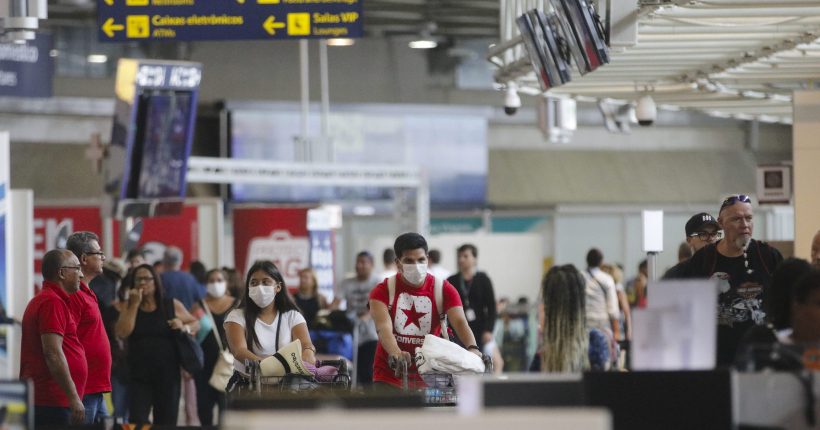RIO DE JANEIRO, BRAZIL – The prospect of spending 10 days in a hotel paying £1,750 (R$13,000) out of their own pockets to enter the UK has led Brazilians vacationing out of British territory to decide to pack their bags overnight and anticipate their return.
‘I wouldn’t be able to afford that amount. It’s more than my rent in London,’ says 40-year-old English teacher Vanessa Lima. She traveled to Rio de Janeiro on New Year’s Eve, precisely to catch an empty flight because of the coronavirus pandemic. She was “constantly following the news” until the date when the new rules would come into force was announced – February 15th – and she booked her return flight for the 13th, two days early.

“The problem is not the ten-day quarantine – we’ve faced confinement before, I’m used to it and even like staying home – the problem is really the amount,” she says.
“I don’t want to pay all that money. The government should invest in an electronic anklet and let people quarantine themselves at home,” joked Gustavo Meixner, 41, while standing in line at immigration. He has lived in the UK for 14 years and returned from Brazil on Wednesday, February 10th, along with several Brazilians who did likewise to escape having to quarantine in hotels.
The rules apply to UK and Irish residents returning from 33 ‘red list’ countries, such as Brazil and South Africa. It is the government’s latest attempt to contain infections by new coronavirus strains (considered more infectious and dangerous) found in these countries.
Anyone trying to conceal having passed through a ‘red list’ country on a government form (which must be submitted upon boarding and immigration) will face fines of up to £10,000 or prosecution, with the risk of facing a prison sentence of up to 10 years.
Some 1,300 people are now entering the UK every week from the 33 red-listed countries, according to UK Transport Secretary Grant Shapps.
Everyone traveling to the UK is required to present a negative covid-19 test taken within 72 hours before boarding, under penalty of a £500 fine and 10 days in isolation. Travelers coming from countries out of the 33 red-listed will be required to take two covid tests at their own expense during the 10-day quarantine period also beginning on February 15th.
Meixner traveled with his family to Brazil for a vacation in December. He was to return in January, but had several flights canceled, and began working from his native country. When the requirement to stay in a hotel was announced, he searched for new flights – “which were very expensive” – to escape the forced quarantine and managed to land on Wednesday, February 10th, a few days before the new rules would come into force.
For 29-year-old Stephanie Camargo, the prospect of being cooped up, without even being able to open the window was what frightened her the most. She had been in Rio since March last year, when she traveled for two weeks due to a health issue and ended up staying the whole year. She intended to return in April, but anticipated her return by two months. “The main challenge was to find information on what was going to happen. I can only imagine what it was like for those who hadn’t bought a ticket yet,” she says.
His plans to return only in April, when the cold weather starts to ease off in the UK, were also frustrated for 45-year-old administrator João Sibin. “They came up with this hotel business, I just ran. There are already comments that there will only be 20 minute long daily walks with an officer. I will quarantine at home,” he said, while standing in the immigration line. He had traveled to Brazil in early November to spend time with his family. But a week ago he decided to anticipate his return to escape the hotels, and his plans in Brazil were left behind. “My father is having a cataract operation next week, I was going to go with him. My mother and father have health problems, I wanted to support them.”
“I wouldn’t want to pay £2,000 for a hotel if I live here,” said Helynd Feltrin, a 26-year-old TV producer who has lived in London for five years. According to her, six of her flights were cancelled until she finally managed to reschedule one with a stopover in Paris to reach the UK.
Vanessa Oliveira, a 37-year-old project manager, thinks hotel quarantine makes sense to monitor travelers. “But if you have somewhere to isolate yourself without endangering other people, it’s easier than having to pay for all that,” she says, as she waited for her flight from Paris to London on Thursday, February 11th, after catching one from Brazil.
Travelers returning to the UK on Wednesday, February 10th, after the new rules were announced, faced a three-hour line to enter the country at Heathrow International Airport.
So far, the government has outsourced 16 hotels with 4,600 rooms. More will be booked as needed. The package travelers from banned countries will have to cover includes transportation, meals, hotel, security, and coronavirus tests. Accommodation must be booked in advance through an online reservation system.
Source: BBC News Brasil

